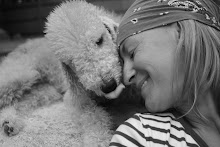Socializing your pup is extremely important during the early weeks and months of ownership, yet many owners and even some veterinarians are nervous about the spread of illness during this time period. What to do? Proceed with caution and be proactive, I say.
Be careful where and with whom you choose to socialize your puppy. Stay clear of dog parks and crowded beaches and parks where adult dogs congregate in large numbers until your pup is better able to handle these situations. Ask if your vet's office offers any puppy social hours. Some vets invite new pups and their owners into the clinic after hours for a bit of social play (for the pups) and education (for the owners). Check with your local dog supply stores to see if they offer puppy play groups. For my local group, which meets weekly on Sundays, I ask that new pups have their first round of shots and preferably the Kennel Cough (Bordatella) vaccine as well before coming to play.
It's important for owners to realize, however, that their pup may still get an illness despite careful selection of play experiences. Think of it this way: if your child attends nursery school, they may catch a cold or the flu if it's going around. The same is true with puppies. Feeding your pup a healthy diet, offering plenty of fresh water and ample opportunities to rest will help build a strong, hearty pup - i.e. a pup with a healthy immune system who may be able to fight off or prevent passage of certain viruses.
The Kennel Cough vaccine works like the flu vaccine for humans. It protects against the major strains of the Bordatella virus, but not all strains. Your pup may still contract the illness despite having had the vaccine, but the vaccine provides some level of protection and is worth having if you plan to board or socialize your pup.
Anther common puppy (and adult dog) illness is giardia. Giardia is commonly known as Beaver Fever in the human world. Giardia is a bacteria found in the feces of many wild animals and in dogs as well. Giardia can get into the water source and spread to other dogs through contact with contaminated water in puddles, ponds, streams, etc. Giardia can also be passed from pup to pup through contact with feces or even through mouth play or drinking from a community water bowl. Thus, it's a good idea to always bring water and a bowl for your pup to play groups and social occasions. Even if your own pup does not eat feces of other dogs, if s/he is sharing the water bowl with others who have, there is a chance that other dogs have introduced the bacteria into the water bowl via their mouths. Avoid community water bowls at dog parks and at dog supply stores, since you don't know who else has been drinking from those sources.
Here at DWD, the community water bowl is switched out several times per day. All bowls are sanitized with a kennel-strength cleaner before being reused. Dogs who eat poop habitually are dismissed from school for the safety and health of the pack.
Both Kennel Cough and Giardia are treatable with meds. For lists of common symptoms and course of treatment, consult your vet or do a Google search. These illnesses are not life-threatening, but they do take your pup out of the social scene for a while.


No comments:
Post a Comment